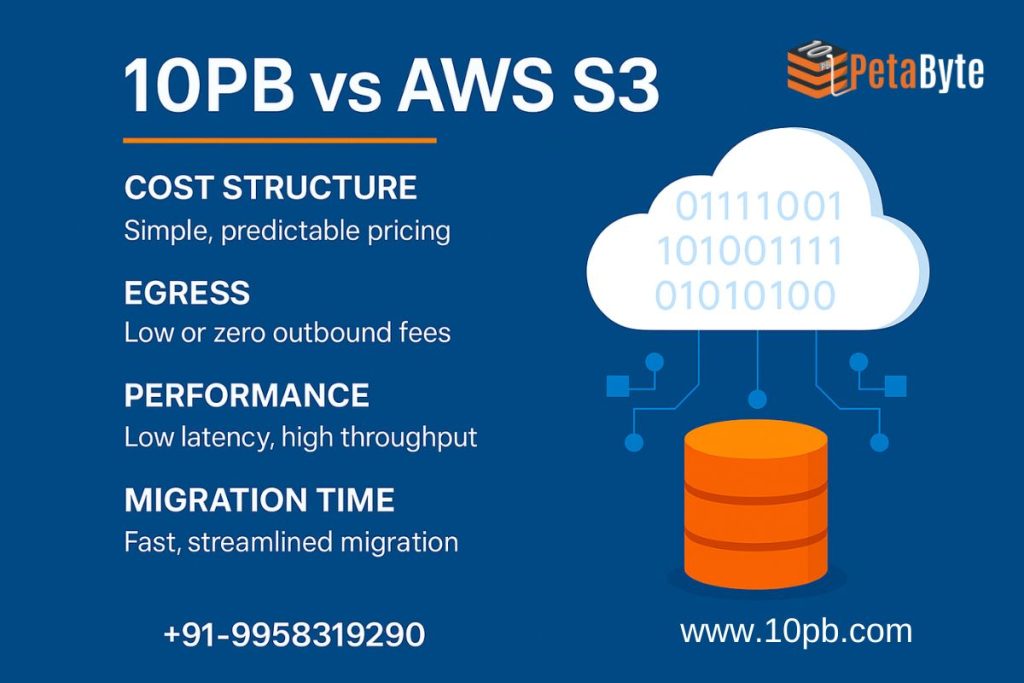Introduction
Cloud object storage is fundamental to digital transformation. Organizations require storage solutions like 10PB vs AWS S3 that are scalable and reliable, from AI training datasets to backups and enterprise collaboration. TenPB vs AWS S3 has been a common point of comparison among organizations evaluating storage based upon flexibility, cost, and efficiency.
While AWS S3 is the long-established industry leader, 10PB object storage is positioned as a modern alternative with transparent pricing and performance built for the high-volume workloads we see today.
In this blog, we will compare 10PB vs AWS S3 cost structure, egress charges, speed, and the migration experience to help you determine which platform is right for you.
Cost Structure: Simplicity vs Tiered Pricing
Companies often prioritize cost when considering 10PB vs AWS S3 a storage product at scale.
- 10PB Costs
10PB has a more straightforward flat-rate pricing structure. There are no unexpected charges for request volumes, and you will not need to manage multiple classes. This can provide your finance teams with more predictability.
- AWS S3 Costs
Amazon S3 has various storage classes, including Standard, Infrequent Access, Glacier, and other classes, which allow for some optimization use cases. However, it can be somewhat convoluted. AWS also charges for API calls, lifecycle transitions, and replication. With all of these components, the monthly cost can be unpredictable.
Takeaway: If your company likes to have clearly stated billing and does not want to deal with multiple line items, 10PB is a clearer answer.
Egress Fees: The Silent Budget Drain
Data egress, or outbound transfer, tends to be an unexpected cost center for enterprises by 10PB vs AWS S3.
- 10PB Egress
10PB limits or eliminates egress fees, so organizations are able to freely move and share data without worrying about cloud storage pricing of unexpected outbound data transfer.
- AWS S3 Egress
Every gigabyte of data moved out of AWS’s orbit will incur a charge. For companies that offload and share datasets frequently, those costs can quickly spiral.
Takeaway: For heavy data mobility, 10PB will be beneficial as AWS egress fees will create a serious burden.
Looking for Premium Services in Netforchoice
Performance: Speed for Data-Driven Workloads
In particular industries that deploy AI by 10PB vs AWS S3, analytics, or real-time applications, latency and throughput are critical to the end-user experience.
- 10PB Performance
10PB is built on low latency and high throughput, making it optimal for AI/ML training and workloads that require instant access to massive datasets.
- AWS S3 Performance
S3 provides consistent access to its global presence through a significant number of global infrastructures. Performance defines the AWS Region selected for access, with latency potentially hampering performance based on geolocation.
Takeaway: While AWS S3 is a reliable choice – 10PB is designed for speed in the AI-specific environment.
Migration Time: Getting Started Quickly
Transferring large amounts of data by 10PB vs AWS S3 can often be lengthy work.
- 10PB Migration
10PB allows easier migration, as it has better onboarding, less downtime, and a more user-friendly process that reduces friction through migration.
- AWS S3 Migration
AWS has Snowball and DataSync for this type of work, but often times it requires different trained teams and additional tools and uses up resources and adds complexity.
One point: 10PB is generally faster to deploy, if fast set up is the priority.
Combining 10PB’s simplified migration with on-prem or modular deployments such as NPod Micro Data Center ensures business continuity
Security & Compliance
Both 10PB vs AWS S3 providers are committed to maintaining high security but have a slightly different compliance focus.
- 10PB supports compliance but also provides data sovereignty features to allow enterprises to manage where information is stored.
- AWS S3 complies with all of the popular frameworks – GDPR, SOC 2, HIPAA.
When 10PB Fits Better than AWS S3
- AI/ML Training: Faster dataset access.
- Global Teams: Reduced egress costs for cross-region collaboration.
- Media & Streaming: Quick retrieval at lower costs.
- SMEs & Startups: Simple pricing that avoids unexpected bills.
- Enterprises with Data Mobility: Affordable large-scale transfers.
Conclusion
The debate of 10PB vs AWS S3 comes down to business priorities.
- If you need predictable pricing, reduced egress, quick migration, and AI-ready speed, 10PB is the more practical choice.
- If you want broad ecosystem integrations and a legacy platform, AWS S3 remains a safe option.
For enterprises that handle massive, frequently accessed datasets, 10PB provides a clear financial and operational advantage.
FAQs
Q1. Why should one compare 10PB versus AWS S3?
Both services offer scalable object storage. However, they have different pricing structures, performance levels as well as data transfer policies.
Q2. Does 10PB really lower costs when comparing AWS S3?
Yes, 10PB generally provides transparent pricing and low egress fees that reduces the total cloud storage bill.
Q3. Which is better for AI workloads?
10PB is designed on low-latency performance ideal for AI Machine Learning model training and analytics workloads.
Q4. How long will it take my company to complete migration on 10PB vs AWS S3?
10PB provides a faster and easier migration experience. Approximately 35 minutes compared to AWS S3 where migration can be expected to take place over a series of steps and tools creating additional complexity.
Q5. Are both services secure and compliant to security requirements?
Yes, Both services meet security and compliance requirements, but 10PB also is based on regional data sovereignty as added security measure.

